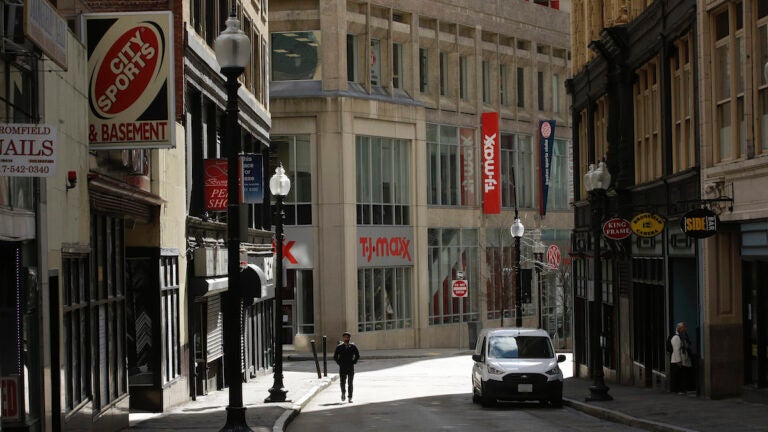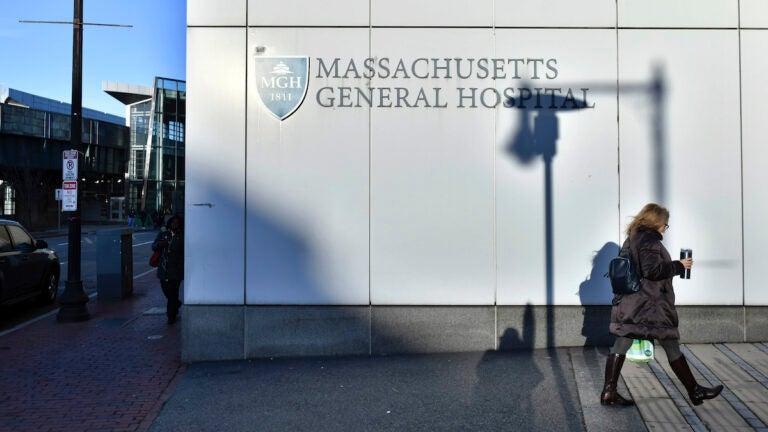‘It’s eerily quiet’: With empty streets, certain crimes see drops in Boston and Cambridge
"We're out there enforcing the law, make no mistake."

Related Links
Traffic stops and certain reported crimes across Massachusetts highways and on the streets of Boston and Cambridge have decreased in recent weeks as the region hunkers down during the coronavirus pandemic, local and state authorities say.
In Boston, “Part 1 crime,” which includes rape and attempted rape, residential burglary, and larceny, among other offenses, dropped 15 percent in March, with 1,067 incidents recorded, compared to 1,256 crimes logged in March 2019, according to data provided to Boston.com.
The city averaged 1,556 cases each March since 2010, though crime rates have generally trended downward in March year over year.
Residential burglaries in Boston have dropped due to the fact people are staying home, according to Boston police Sgt. Det. John Boyle.
“The residents of Boston can feel safe that the police are out there,” Boyle said in an interview Wednesday. “We’re out there enforcing the law, make no mistake.”
In Cambridge, monthly data was not readily available Wednesday, according to Jeremy Warnick, a department spokesman.
But he pointed to the city’s daily police logs for March 25 and 26 to illustrate just how much the volume of the department’s work has shifted amid the health emergency.
On both days, authorities filed reports for only five incidents, although the public records do not include certain crimes that law enforcement agencies are prohibited from publishing under state law, such as domestic abuse and mental health cases. On Tuesday, police recorded only three incidents.
But in recent weeks, the department has seen an overall decrease in both crime and calls for service, Warnick said.
“I think a lot of it is because people are staying home and we have a lot of businesses shut down,” Warnick said. “It’s eerily quiet in the city.”
There are also fewer drivers on the road — and Massachusetts State Police troopers have conducted fewer traffic stops and related arrests.
“Because motor vehicle traffic has been so greatly reduced, there are far fewer traffic offenses for troopers to observe and thus far fewer car stops,” state police spokesman David Procopio said in an email. “Thus also, there are far fewer instances of Troopers arresting motorists for OUI or for having something illegal, i.e. drugs or guns usually, in their possession.”
Notably, amid a push to reduce the Bay State’s incarcerated population to limit the spread of COVID-19 inside prisons and jails, some prosecutors and authorities have changed how they handle certain crimes, using arrests only when absolutely necessary.
But police are also bracing for a potential increase in particular crimes as residents embrace self isolation and home confinement.
Both Boston and Cambridge police have released information with resources about how to report and handle incidents of domestic abuse as part of that anticipation.
“With community members encouraged to stay home to mitigate the spread of the coronavirus, the Boston Police Department recognizes the impact that COVID-19 is having on families in our community and the fact that some may find themselves confined with an abuser,” the department said in a community alert. “This isolation can mean danger for some members of our city.”
Boyle said Boston police have already seen a slight uptick in those cases. Department data shows 87 cases of domestic aggravated assault were logged in March.
“We remind everybody that if they are experience any issues with domestic violence, that would be a case to call 911,” he said, adding that neighbors should also remain vigilant in reporting these crimes. “There is no excuse for domestic violence.”
PLEASE SHARE: Our Domestic and Sexual Assault Unit has put together an updated resource guide to assist at risk individuals and families who are in need of support due to domestic violence, sexual violence, family violence and partner abuse. #COVID19 #CambMA pic.twitter.com/aifRytjxOM
— Cambridge Police Department (@CambridgePolice) March 27, 2020
State police have begun tracking domestic homicides and suicides, which detectives respond to throughout most of the commonwealth, “to see if there is a rise in those in this time of social isolation and fear,” Procopio said.
“I hope that does not turn out to be the case, but we want to know if it does,” he said.
State police also record suspected fatal heroin or fentanyl overdoses in most communities.
“Those have remained steady, but again more time is needed to determine if the pandemic has any impact on those,” Procopio said.
Authorities in Boston have released preventative safety guidance for food delivery drivers as more residents rely on those services during the state’s stay-at-home advisory, according to Boyle.
And in Cambridge, police are keeping a close eye on shoplifting and online scams, too, Warnick said.
“Nationally, there’s a lot of concern that these are going to increase and people, especially our elderly population, being taken advantage of,” he said.
While police in the city have received fewer calls than usual these days, authorities have received reports from concerned residents regarding groups and gatherings of people not practicing social distancing, according to Warnick.
Officers speak with these groups and usually tell them why they were called and about the importance of isolating themselves during the pandemic, he said.
“We’re all in this together, so the more people that cooperate, the better off we’re going to be,” he said.







Conversation
This discussion has ended. Please join elsewhere on Boston.com